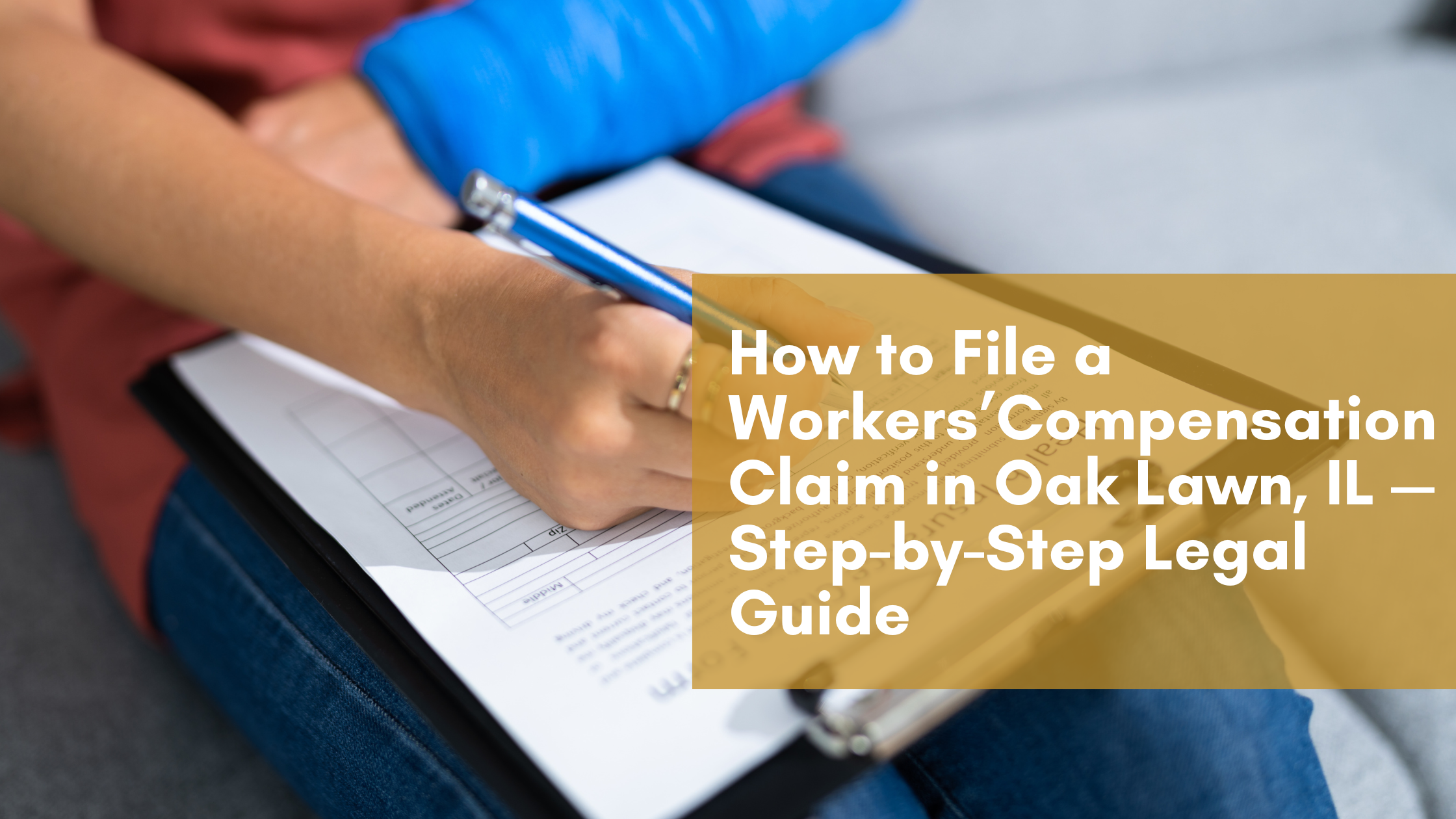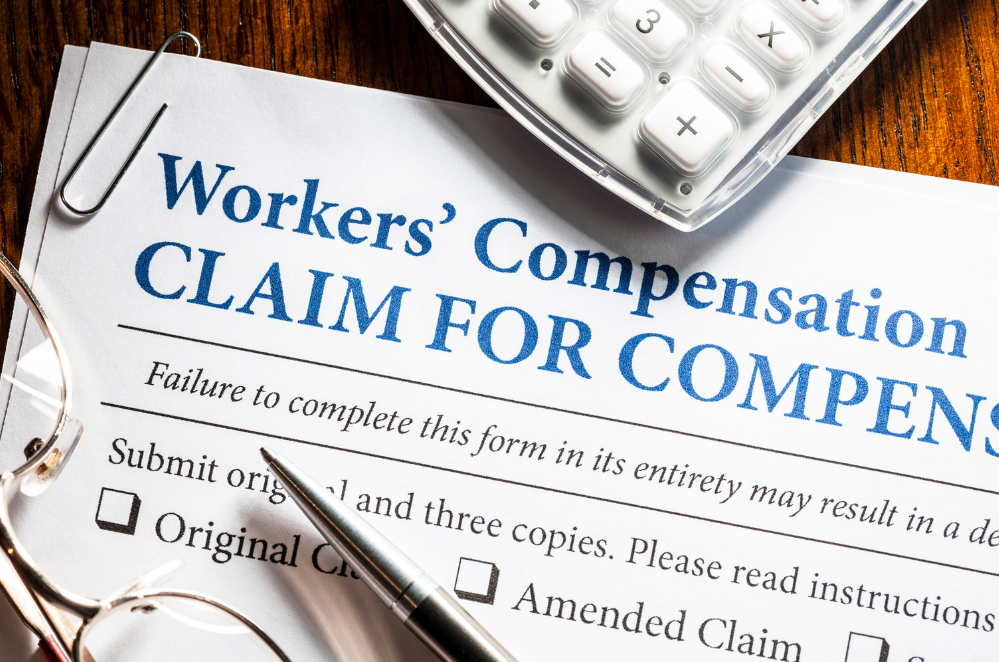You got hurt at work in Oak Lawn. Maybe it was a fall on a slippery warehouse floor. Maybe it was back strain after years of heavy lifting.
Now, you’re left with two pressing fears:
Will I get the medical care and wage benefits I need?
What if I make a mistake and lose everything?
In my experience, most injured workers hesitate not because they don’t want to file — but because the Illinois workers’ comp system feels like a maze. Deadlines, forms, employer pushback… it’s overwhelming.
That’s exactly why this guide exists. Step by step, I’ll show you how to file a workers’ compensation claim in Oak Lawn — and where our firm - William S. Wojcik, Ltd. - comes in to protect your rights.
Understanding Workers’ Compensation in Illinois
Workers’ compensation is designed to protect you when an on-the-job injury disrupts your life.
A good example would be to consider a delivery driver in Chicago who slips on a wet warehouse floor while carrying a package.
Why and how does workers’ compensation apply?
The fall happens during a required work task (moving deliveries).
The injury results in a sprained ankle that requires medical treatment and time off.
Workers’ compensation can cover ER visits, follow-up care, and partial wage replacement while the employee recovers.
Under the Illinois Workers’ Compensation Act, most employees are covered — from factory workers in Oak Lawn’s industrial corridor to office staff in the 103rd Street business district
Who is Covered?
Union and non-union workers
Full-time and part-time employees
Most industries: manufacturing, healthcare, construction, retail, office work
In most cases, coverage applies regardless of fault.
That said, a workers compensation lawyer can provide more details and information regarding coverage application and how the nature of the injury affects your overall coverage.
Types of Benefits You Can Claim
Not all work-related injuries come with the same benefits meaning, the benefits (as listed below) aren’t fixed claims for every injury.
Instead, these benefits are a general overview of what you may expect when filing for a workers compensation claim.
Survivor benefits: If a worker dies due to a workplace injury
Permanent disability benefits: If you cannot fully return to work
Medical care: All reasonable treatment costs, with no out-of-pocket expense
Wage replacement: Usually 2/3 of your average weekly wage while you recover
Vocational rehab: Training for a new role if you can’t perform your old job
Survivor benefits: If a worker dies due to a workplace injury
Confused?
A good way to think about workers’ comp is that it acts as your financial lifeline when your paycheck is suddenly cut off by injury.
Learning more about the step-by-step process should shed more light on the matter.
Step-by-Step: Filing a Workers’ Compensation Claim in Oak Lawn
Filing for a workers compensation claim is where most people struggle.
The process looks straightforward, but each step has rules and deadlines that can derail your claim if you’re not careful or worse, undercompensation.
Step 1: Report the Injury Immediately
Under Illinois law, you must notify your employer within 45 days of the injury. Sooner is better.
When reporting, include:
How the injury occurred
Names of any witnesses
Date, time, and location of injury
Nature of the injury (back strain, fall, repetitive stress, etc.)
Warning: Failing to report in time may bar you from benefits. Don’t assume “my boss knows what happened” counts as formal notice.
Step 2: Seek Prompt Medical Treatment
Your health comes first. Go to a doctor right away and tell them the injury is work-related.
In Illinois, you’re entitled to:
Choose up to two doctors (plus any specialists they refer you to)
All necessary treatment at no cost
Ongoing treatment while your claim is pending
Keep a paper trail: diagnostic tests, prescriptions, therapy notes, and discharge instructions. In my experience, weak or missing medical documentation is the #1 reason insurers try to deny claims.
Step 3: Consult a Workers’ Compensation Attorney
Here’s where many workers go wrong — they try to “DIY” the process until something goes sideways.
By then, deadlines are missed, or paperwork is mishandled.
The result? Longer wait times, undercompensation, and you’re left to carry the burden of all the expenses yourself.
At William S. Wojcik, Ltd., we provide:
Immediate case evaluation
Representation at hearings or arbitration if needed
A tailored legal strategy based on your injury and job type
Handling of all employer and insurance communications
Step 4: File a Claim with the Illinois Workers’ Compensation Commission (IWCC)
If your employer refuses benefits, or if payments are delayed, the next step is a formal claim with the IWCC.
This includes:
Proof of employment
Wage documentation
Medical records and bills
Application for Adjustment of Claim (Form IC-1)
Once filed, your case may proceed to arbitration or hearing. Wojcik Law represents you through each stage, making sure deadlines are met and your story is clearly presented.
Step 5: Track Your Recovery and Benefits
After filing, your claim doesn’t run on autopilot.
Stay engaged:
Follow up your treatment plan
Attend all medical appointments
Report progress (or setbacks) to your attorney
Keep records of any missed workdays and lost wages
Details matter. And being thorough goes a long way to get a full claim.
While it’s certainly possible to do this yourself, having a professional legal team and workers compensation lawyer helps you maintain compliance so benefits continue without interruption.
Think of us as both your advocate and your navigator through a system designed to confuse.
Common Pitfalls to Avoid When Filing a Workers’ Compensation Claim in Illinois
Missing the 45-day deadline to report your injury
Why it matters: Most states (including Illinois) require workers to notify their employer within a specific timeframe (often 30 to 45 days maximum). Waiting too long can make your injury look suspicious or unrelated to work.
Pitfall: Thinking the injury will “get better on its own” and waiting weeks before saying anything.
Fix: Report the injury immediately — even if it seems minor at first.
Underreporting symptoms or skipping medical follow-ups
Why it matters: Medical records are the backbone of a claim. If there’s no doctor visit right after the injury, insurance adjusters can easily argue it didn’t really happen at work.
Pitfall: Relying only on self-care or skipping the doctor because of fear of cost or losing hours at work.
Fix: Get checked by a doctor as soon as possible and follow all treatment recommendations.This will also strengthen your claim.
Trusting the insurance adjuster without legal review
Why it matters: Workers’ comp laws are complex, and insurers aim to minimize payouts. Without guidance, injured workers often accept less than they deserve.
Pitfall: Settling quickly without knowing the long-term impact of your injury.
Fix: It’s strongly encouraged to speak with a workers’ compensation lawyer even for consultation to understand your rights.
DIY filing — thinking you’ll save money, only to lose benefits
Why it matters: Workers’ comp requires consistent details — when, where, how, and what happened. Any inconsistency can be used to question credibility.
Pitfall: Saying “my back hurts” without explaining that the pain started after lifting equipment at work.
Fix: Keep a personal record of the incident, symptoms, and all medical visits. Always give the same account of what happened. Be as detailed, thorough, and accurate as possible.
Assuming Your Employer Handles Everything
Why it matters: While employers must notify their insurance, they may delay, mishandle, or even discourage claims. You are responsible for protecting your rights.
Pitfall: Trusting verbal reassurances like “We’ll take care of it.”
Fix: File the required paperwork yourself and keep copies. Or, work alongside a workers compensation lawyer to ensure the paperwork doesn’t fire back at you.
Appeals & Hearing Process If Your Claim Is Denied
If your claim was denied, don’t panic.
Denials happen — often due to incomplete forms, “pre-existing condition” arguments, or disputes over medical necessity.
Here’s what the appeal process looks like in Illinois:
File an appeal with the IWCC
Gather additional medical and workplace evidence
Attend arbitration hearings (with your attorney advocating for you)
Without experienced representation, appeals drag on.
With Wojcik Law, appeals are strategic — aimed at winning benefits quickly and fairly.
Why Hire a Chicago Attorney vs. DIY
Can you file on your own? Yes.
Should you? That’s another question.
The reality:
Employers have attorneys working against you
Insurance companies minimize payouts to protect profits
Workers without representation often accept lower settlements
Does that mean hiring a lawyer is the only way?
If you want a higher success rate, yes it’s encouraged. However, there are a lot of ways to go about it too.
For one, you can draft the documentation yourself and file the paperwork, then consult a workman’s comp lawyer to fact-check or proofread the information.
Would you spend extra hours on top of work and while fighting your injury to get what you deserve or ask for help to save you time, resources, and effort?
This is where we come in.
Hiring us here at William S. Wojcik, Ltd. means having a Chicago workman’s comp attorney who knows the system inside out. We also have the success stories to prove it.
Clients consistently say the same thing: “I wish I’d called sooner.”
Frequently Asked Questions About Filing a Workers’ Compensation Claim in Illinois Chicago
What is the deadline to file a workers’ compensation claim in Illinois?
You must notify your employer within 45 days and file a claim within 3 years of the injury or 2 years of the last compensation payment.
Can I choose my own doctor?
Yes. Illinois law allows you to select your own physician for treatment.
What benefits am I eligible for?
The benefits you are eligible for a workman’s compensation claim include medical care, wage replacement (typically 2/3 of your average weekly wage), permanent disability, and vocational rehabilitation.
What if my claim is denied?
If your claim was denied, you can appeal through the Illinois Workers’ Compensation Commission. Having an attorney dramatically improves success rates.
How long does it take to get benefits?
It varies. Some cases resolve in weeks; complex cases may take months, especially if appeals are involved.
Get Legal Help for Your Workers’ Comp Claim Today
Filing a workers’ comp claim in Oak Lawn isn’t just about forms. It’s about securing your health, income, and dignity after an injury.
With William S. Wojcik, Ltd., you don’t just get legal guidance — you get a local advocate who’s stood by injured workers across Chicago and Cook County for decades.
Ready to get the benefits you deserve? Call (708) 423-8822 or submit your claim review form online.




